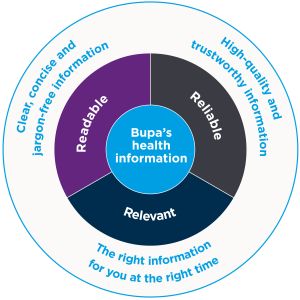About our health information
At Bupa we produce a wealth of free health information for you and your family. This is because we believe that trustworthy information is essential in helping you to live well and protect your health and wellbeing both now and in the future.
Recognition
Creating high-quality and trustworthy information is at the heart of what we do. Here are just a few of the ways in which the quality of our information has been recognised.
Patient Information Forum
Our information has been awarded the PIF TICK for trustworthy health information.

British Medical Association (BMA) patient information awards
We have received a number of BMA awards for different resources over the years. Most recently, in 2018, we were 'commended' for our online dementia information.
It’s not always easy to know who to trust when searching for health information online. You might even like, share or act on misinformation without realising. Discover four ways to find high-quality health information and fight fake health news.
Having round-the-clock access to high-quality health information can help you take control of your health and discover ways to live well. But fake or misleading health information can be scaremongering and even dangerous. It’s not always easy to know who to trust when searching for health information online. And fake news often spreads faster than the truth. You might even like, share or act on misinformation without realising.
So how can you make sure that the health information you’re reading online is trustworthy, reliable and accurate? Ask yourself these four questions, to find the facts, stop misinformation and spot fake health news.
1. Who is it coming from?
Start by asking yourself if the information has come from a credible source. Look at who the author is and if the right experts have helped to produce the information. Then look for an accreditation or mark of quality, such as the Patient Information Forum tick. This is only awarded to organisations who follow high quality standards when producing health information.
2. Where have the facts come from?
Make sure any claims are backed up by high-quality sources. Trustworthy organisations will be open about how they produced their information. Many will also include a list of sources so you can check where their facts came from and find out more.
3. When was it produced?
Check when the information was published or updated. Medical research is constantly evolving, so information should be dated within the last three years or less.
4. What do I understand now?
Finally, the information should be clear, free from complex language, medical jargon, and spelling mistakes. The best providers of health information will do their best to untangle the science and make it as easy as possible for you to understand.
So next time you’re searching for health information online, protect yourself and others from harmful misinformation by asking: Who, where, when and what?
Our core editorial principles

All our health content is produced in line with our core editorial principles: readable, reliable, relevant.
‘The Three Rs’ encompass everything we believe good health information should be. Every piece of content we produce, from topic pages and articles to videos and quizzes, has these as its foundation.
Readable
In a nutshell, our information is jargon-free, concise and designed with you in mind. We understand your content needs and challenges, and strive to overcome these.
Reliable
We use high-quality and up-to-date evidence to produce our information. Our information has been awarded the PIF tick and is guided by principles of The Information Standard. Our information is produced by a team of specialist health editors in collaboration with appropriate clinical experts who are named and thanked for their input on the page.
Relevant
It’s important that you get the right information at the right time, in a way that suits you best. So, we use insights and your feedback to help shape our information, and regularly user test it to make sure it’s meeting your needs. We review our content at least every three years to keep it fresh and aim to meet your content needs whenever and wherever you need us.
Don’t just take our word for it. Here’s what our users have to say about our health information:
Helpful health information websites
Bupa has a wealth of free health information to support you with your health and wellbeing. But there are also many other organisations, from public health bodies to specialist charities, that can help you understand and manage your health through high-quality health information.
We've collated a list of trusted health information providers. The organisations on our list are either PIF TICK accredited, or they have been chosen for inclusion by the Bupa Health Content Team. This is not an extensive list and there may be other organisations that can help.
Contact us
If you have any feedback on our health information, we would love to hear from you. Please contact us via email: [email protected].


